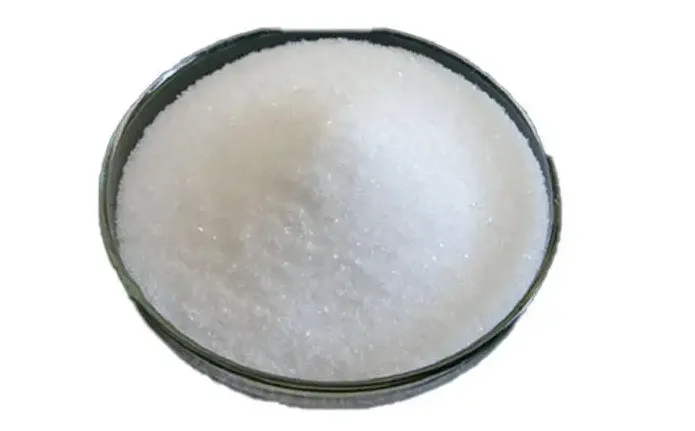Fokus pada Berbagai Fungsi Sodium Pyrofosfat Food-Grade dalam Pemrosesan
Fleksibilitas Pemrosesan Sodium Pyrofosfat
Sodium Pyrofosfat food-grade bukan hanya agen pengubah kualitas; ia juga bertindak sebagai pengemulsi, buffer, dan agen pengkelat. Efek pengkelat dan pendispersinya signifikan, memberikan anti-flokulasi, pencegahan oksidasi lemak, dan adhesi protein keju. Nilai pH-nya yang tinggi juga membantu menghambat pembusukan dan fermentasi.
Sodium Pyrofosfat food-grade bukan hanya agen pengubah kualitas; ia juga bertindak sebagai pengemulsi, buffer, dan agen pengkelat. Efek pengkelat dan pendispersinya signifikan, memberikan anti-flokulasi, pencegahan oksidasi lemak, dan adhesi protein keju. Nilai pH-nya yang tinggi juga membantu menghambat pembusukan dan fermentasi.
Penggunaan Sodium Pyrofosfat dalam Produk Daging dan Produk Akuatik
Sodium Pyrofosfat terutama digunakan dalam pemrosesan daging dan produk akuatik untuk meningkatkan retensi air, menjaga kelembutan daging, dan menstabilkan pigmen alami. Dalam pembuatan pati, sering dikombinasikan dengan fosfat lain. Tingkat penambahan yang umum adalah 0,5-3‰, dengan maksimum 3% dalam pemrosesan produk akuatik.
Sodium Pyrofosfat terutama digunakan dalam pemrosesan daging dan produk akuatik untuk meningkatkan retensi air, menjaga kelembutan daging, dan menstabilkan pigmen alami. Dalam pembuatan pati, sering dikombinasikan dengan fosfat lain. Tingkat penambahan yang umum adalah 0,5-3‰, dengan maksimum 3% dalam pemrosesan produk akuatik.
Jaminan Keamanan Kimia Goway
Produsen terkemuka seperti Goway Chemical menyediakan bahan tambahan makanan yang sesuai dengan standar keamanan pangan nasional. Konsumen dapat membeli dengan percaya diri, yakin akan keamanan pangan.
Produsen terkemuka seperti Goway Chemical menyediakan bahan tambahan makanan yang sesuai dengan standar keamanan pangan nasional. Konsumen dapat membeli dengan percaya diri, yakin akan keamanan pangan.
Penggunaan Multi-Faset Sodium Pyrofosfat Food-Grade
Dalam industri makanan, Sodium Pyrofosfat food-grade berfungsi sebagai agen pengubah kualitas, pengatur pH, agen pengkelat ion logam, pengemulsi, pendispersi, dan perekat. Dalam produksi kecap dan jus, ia meningkatkan warna dan kecerahan produk. Ini memainkan peran penting dalam stabilitas, elastisitas, rasa, dan sifat antioksidan produk unggas kaleng.
Dalam industri makanan, Sodium Pyrofosfat food-grade berfungsi sebagai agen pengubah kualitas, pengatur pH, agen pengkelat ion logam, pengemulsi, pendispersi, dan perekat. Dalam produksi kecap dan jus, ia meningkatkan warna dan kecerahan produk. Ini memainkan peran penting dalam stabilitas, elastisitas, rasa, dan sifat antioksidan produk unggas kaleng.
Pertanyaan yang Sering Diajukan (FAQ)
- Apa itu Sodium Pyrofosfat?
- Sodium Pyrofosfat adalah senyawa kimia yang digunakan sebagai aditif dalam pengolahan makanan, melayani berbagai fungsi seperti agen pengubah kualitas, pengemulsi, buffer, dan agen pengkelat.
- Bagaimana Sodium Pyrofosfat bermanfaat bagi pengolahan daging dan produk akuatik?
- Ini meningkatkan retensi air, menjaga kelembutan daging, dan menstabilkan pigmen alami, meningkatkan kualitas produk secara keseluruhan.
- Berapa tingkat penggunaan tipikal Sodium Pyrofosfat dalam pengolahan makanan?
- Tingkat penambahan yang umum adalah 0,5-3‰, dengan maksimum 3% dalam pemrosesan produk akuatik.
- Mengapa Sodium Pyrofosfat digunakan dalam produksi kecap dan jus?
- Ini meningkatkan warna produk, membuatnya lebih cerah dan menarik.
- Apa peran Sodium Pyrophosphate dalam produk unggas kalengan?
- Ini berkontribusi pada stabilitas, elastisitas, rasa, dan sifat antioksidan dari produk unggas kalengan.
- Apakah ada jaminan keamanan untuk Sodium Pyrophosphate?
- Ya, produsen terkemuka seperti Goway Chemical menyediakan bahan tambahan makanan yang memenuhi standar keamanan pangan nasional, memastikan keamanan konsumen.
- Bagaimana Sodium Pyrophosphate mencegah pembusukan dan fermentasi?
- Nilai pH-nya yang tinggi menghambat pembusukan dan fermentasi, memperpanjang umur simpan produk makanan.
- Bisakah Sodium Pyrophosphate digunakan dengan fosfat lain?
- Ya, sering dikombinasikan dengan fosfat lain dalam pembuatan pati untuk efek yang lebih baik.
- Apa dampak lingkungan dari produksi Sodium Pyrophosphate?
- Proses produksi harus dikelola dengan baik untuk meminimalkan konsekuensi lingkungan, seperti polusi.
- Bagaimana konsumen dapat memastikan bahwa mereka membeli Sodium Pyrophosphate yang aman?
- Konsumen harus membeli dari produsen terkemuka seperti Goway Chemical, yang mematuhi standar keamanan pangan nasional.

